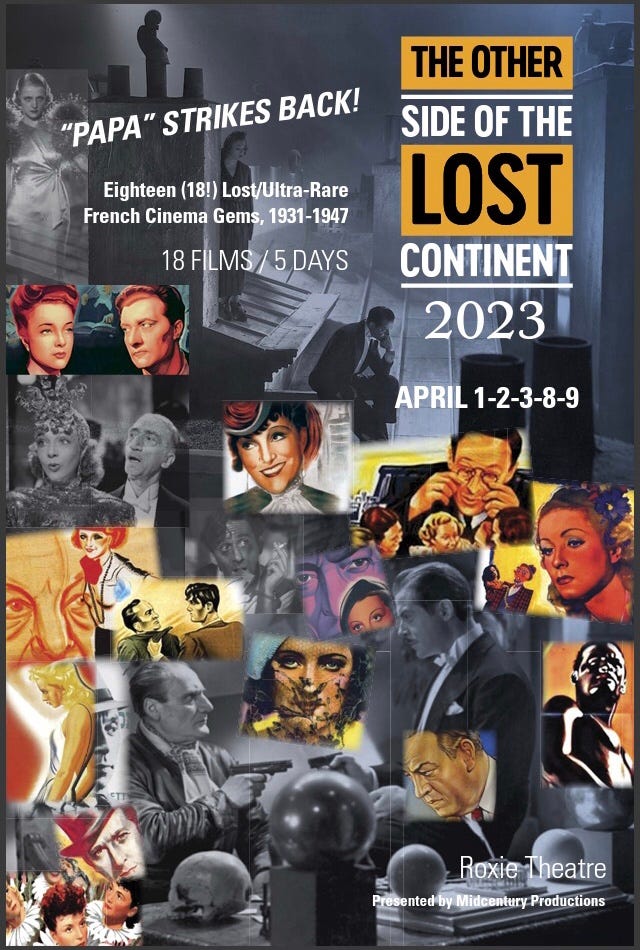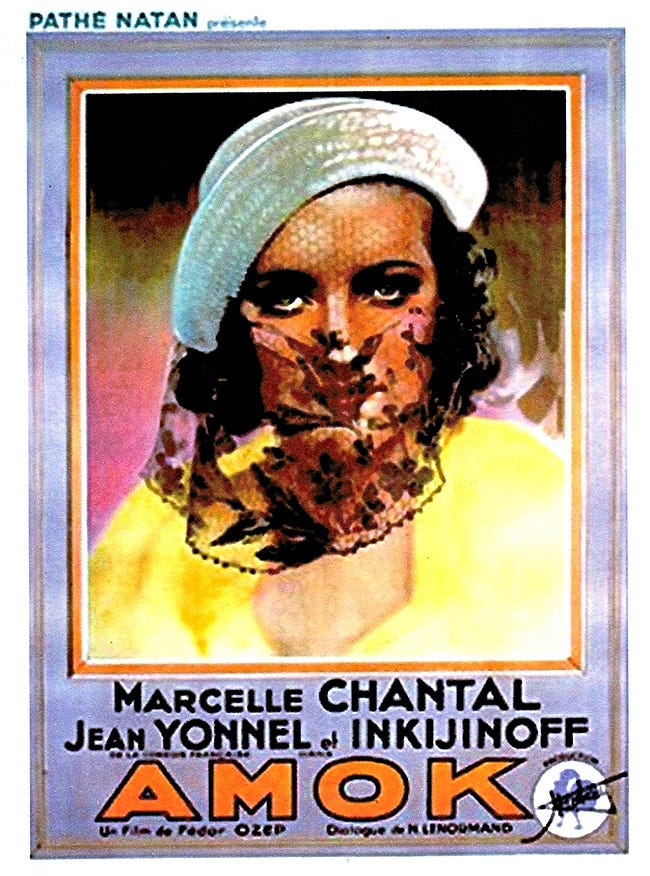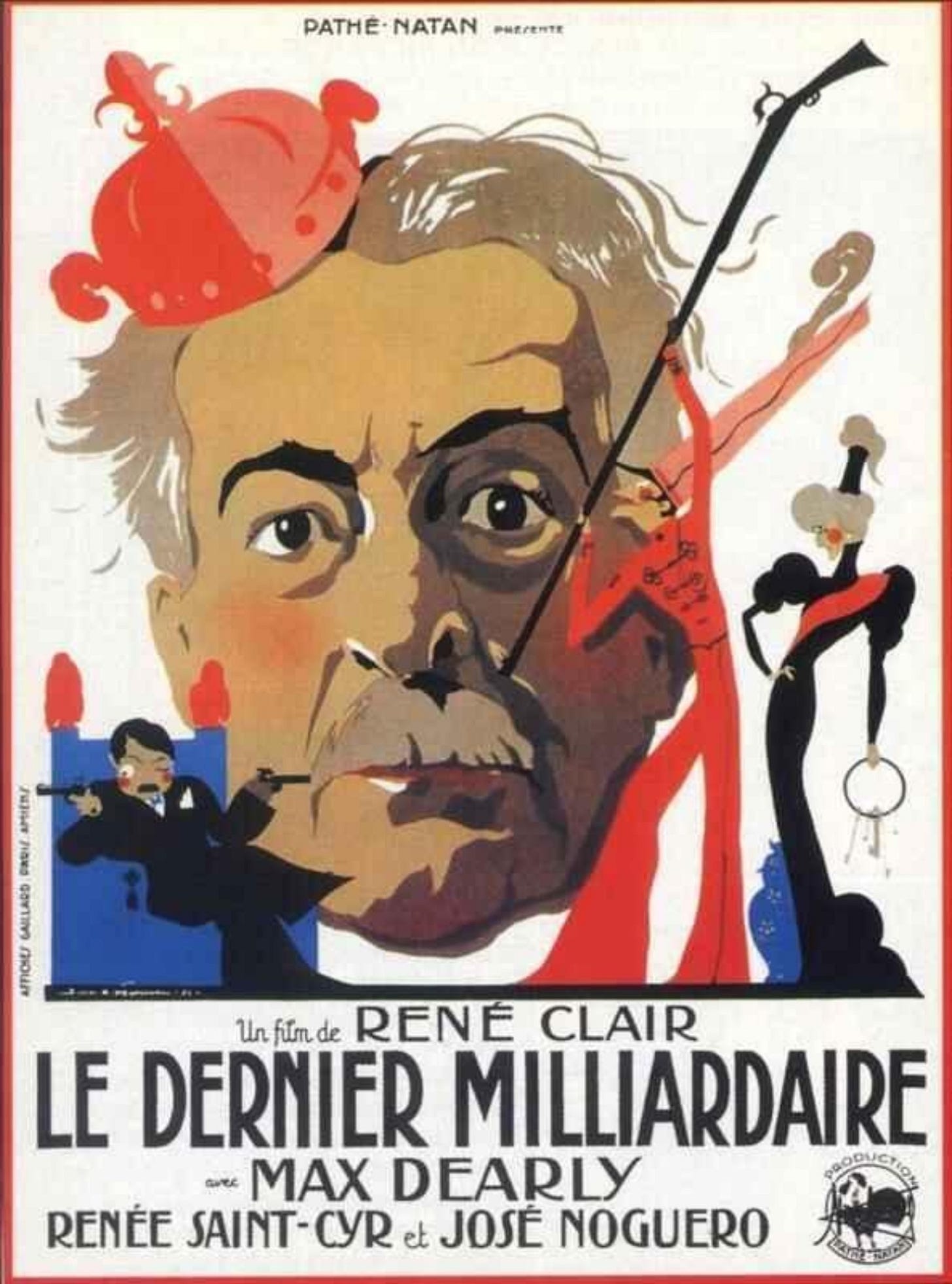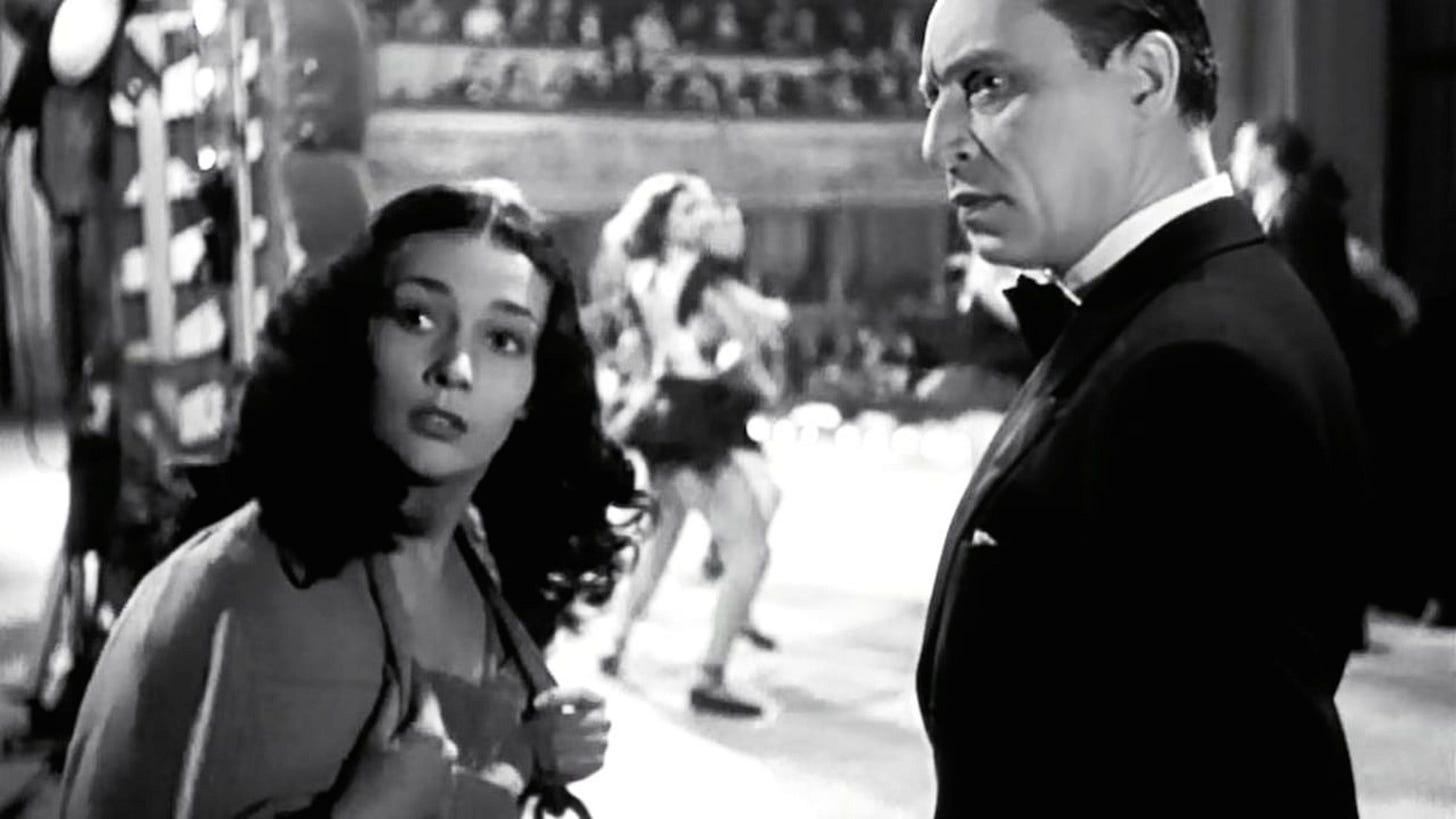April isn’t always the cruelest month—and we are here to provide 18 counter-examples that soften T. S. Eliot’s famous phrase beginning on the first of that month with our upcoming “PAPA” STRIKES BACK! series (aka THE OTHER SIDE OF THE LOST CONTINENT ‘23).
Due to some quirks in the Roxie’s new web site, we’ll provide you with thumbnail film descriptions here to help clinch your decision to buy an all-festival pass (via this PayPal link which is also at the end of this essay).
OUR poster showcases some in situ B&W images from LA NUIT FANTASTIQUE, one of our favorite rediscoveries amongst the bounty of rare and lost films made in France during the 30s and 40s—prime “cinema de papa” time fully deserving of its long-overdue resurrection. Surrounding them are the incredibly colorful—and incredibly varied—faces who may not yet be familiar to you, but will be old friends by the time we conclude on Sunday evening, April 9th.
And here are capsule descriptions of what you’ll be seeing:
Saturday April 1 MATINÉE
‘30s passion! Triple feature matinée…
The Night Beauty/La belle de nuit
(1934, Louis Valray, 87 min) 12:00
The lost director Louis Valray (recently rediscovered by the intrepid Serge Bromberg at Lobster Films) is our entry into a world of romantic transgression as a jilted lover (Aimé Clariond) prepares a strange dish of revenge involving a lookalike for the woman who threw him over (Russian emigré Vera Korène in a double role) only to experience unintended consequences…
Thirteen Days of Love/Escale
(1935, Louis Valray, 83 min) 1:45
Valray dispenses with the ties to Paris life he used as a pretext for the action in La belle de nuit and takes us directly to the humid, doleful south of France where the waterfront is the catalyst for the romantic misadventures of Eva (Colette Darfeuil) as she wallows in the decadent allure of La Belle Escale—Marseille’s version of the Hotel California…
Amok
(1934, Fedor Ozep, 92 min) 3:30
Parallels to pre-Code America (Red Dust) and early noir (The Letter) don’t go far enough to capture the overheated strangeness conjured by Russian-born director Ozep, who was clearly influenced by the 1927 silent Soviet version directed by Kote Marjanishvili. Romanian emigré Jean Yonnel is Dr. Holk, whose tour of duty in the Indonesian jungle seeking a cure for an outbreak of madness (“amok”) among the natives takes a fateful turn when he meets Hélène Haviland (Marcelle Chantal), leading to a case of l’amour fou that just won’t quit.
[You’ll find that these will remind you of pre-Code films; but these French tales take off where the American films, racy as they often are, tend to stop! Consequently, we will give you Saturday night off to rest up for our patented five-film Sunday…!]
Sunday April 2 MATINÉE
’30s sexism, greed, and…ghosts! triple feature matinée…
Dactylo
(1931, Wilhelm Thiele, 77 min) 12:00
The twists and turns of the “sexual runaround” experienced by a young woman (Marie Glory) as she seeks to rise from the typing pool at a Parisian bank. A story so popular (and topical) that it was filmed in four different countries (Germany, France, Spain, UK) during the same year!
The Last Billionaire/Le dernier milliardaire
(1934, René Clair, 90 min) 1:30
Chaos reigns when the desperate queen of Casinario (Monaco, anyone?) tries to marry off her granddaughter (Renée St. Cyr) to the only tycoon who escaped the European stock market crash (Max Dearly), who channels a madcap version of his “inner authoritarian” once he’s “in charge.” René Clair savages capitalism and the aristocracy in his final film in France before “escaping” to America—and doing so, perhaps, not a moment too soon!
The Tender Enemy/La tendre ennemie
(1936, Max Ophuls, 69 min) 3:15
Three ghosts attend an engagement party for a young woman who is being forced by her mother (Simone Berriau) to marry a man she doesn’t love. Will the revelations of the ghosts’ involvement with the mother induce events that can save the girl from a lifetime of unhappiness? Max Ophuls shifts gears in this brilliantly bittersweet comedy/fantasy that was the template for other inspired fantasies that followed (La nuit fantastique, Sylvie et le fantome, Les jeux sont faits).
Sunday April 2 EVENING
Early evening double feature with Harry Baur!
The Old Devil/Cette vieille canaille
(1933, Anatole Litvak, 99 min) 5:15
No French film festival from the 1930s is worth its salt without at least two appearances from the great Harry Baur, one of the most unlikely (yet somehow inevitable) giants of French cinema. Here he is Vautier, a surgeon who is smitten by a young girl (Alice Field) and pays the girl’s mother in order to marry her. But she falls for a dashing young trapeze artist (Pierre Blanchar) and director Anatole Litvak—shortly to depart for Hollywood—sharpens the angles of his triangle tale to the razor’s edge of no return.
Samson
(1936, Maurice Tourneur, 90 min) 7:15
This time Harry Baur is a copper magnate and the pillar (get it?) of the Paris Stock Exchange who marries (for love) the daughter of a destitute aristocratic family (Gaby Morlay). Just how self-destructive will this “Samson” prove to be when he discovers that she is stepping out on him with one of his own protégés (André Luguet)?
[Capitalists, ghosts, and their connective tissue in the form of the “great man with a flaw”—all this makes for a stirring cross-section of French film in the 1930s…]
Monday April 3
Evening double feature—Henri Decoin & Danielle Darrieux!
She Returned at Dawn/Retour à l'aube
(1938, Henri Decoin, 94 min) 6:45
Danielle Darrieux and Henri Decoin made seven films together before divorcing—we have two of them for you on a special “Monday night bonus” screening. Here the ravishing young Darrieux is a neglected wife whose husband works the Hungarian rail line. Longing for the big city life, she seizes on an opportunity to go to Budapest, where she will discover that her dreams of being Cinderella have an unexpected dark side.
Beating Heart/Battement de coeur
(1940, Henri Decoin, 97 min) 8:30
German emigré screenwriter Max Kolpé, a frequent colleague of Billy Wilder, teams with Henri Decoin for a sly twist on the Cinderella theme as Danielle Darrieux plays a runaway girl who falls in with a gaggle of pickpockets and becomes an “asset” as they wreak havoc on Parisian nightlife. But a possible Prince Charming (Claude Dauphin) suddenly enters the picture: will she or won’t she find a way to escape to a new life?
[And at this point you’ll receive four days of R&R as we get set to take you into the 1940s for the second weekend of PAPA STRIKES BACK…read on!]
Saturday April 8 MATINÉE
Occupation Era quartet Part 1: Albert Valentin
Marie-Martine
(1943, Albert Valentin, 103 min) 12:00
MCP is honored to present the American premieres of two works from another notable filmmaker: Albert Valentin, who—like Louis Valray—has slipped through the cracks of cinema history. His first film is a challenging exercise in “backward time”: scandal-mongering novelist Loic Limousin (noted character actor Jules Berry) continues to stalk and exploit Marie-Martine (Renée St. Cyr), a “woman with a past” trying to put it all behind her. We see her story unfold in a complex and highly unusual way, always wondering whether she will somehow avoid further suffering at the hands of the despicable Limousin.

Life of Pleasure/La vie de plaisir
(1944, Albert Valentin, 85 min) 2:00
More flashback virtuosity on display from Valentin (with the eminent Charles Spaak providing the sharp-edged dialogue) in this tale of a divorce proceeding that lays bare all of the hypocrisy and deceit of the French upper classes, as they try to hold their societal position even in the midst of the Occupation. Featuring an especially dynamic performance from Albert Préjean, La vie de plaisir was shunned and banned after the war and is still shockingly unknown nearly eighty years after it was made. MCP is proud to bring it to America for the very first time…
Saturday April 8 EVENING
Occupation Era quartet Part 2: Decoin/Darrieux redux & Marc Allegret (early evening)
Her First Affair/Premier rendez-vous
(1941, Henri Decoin, 105 min) 4:30
In our third Darrieux/Decoin collaboration, Max Kolpé supplies yet another loopy twist on the Cinderella story, this time fusing in a plot element that will remind you of the central romantic deception in Ernst Lubitsch’s Shop Around the Corner—but taken to greater comic effect. In this film we can truly say that Danielle Darrieux does it all—she’s sexy, she’s wacky…she even sings! (And during the film’s creation she threw over her husband Decoin for notorious playboy Porfirio Rubirosa!)

The Little Ones of the Flower Platform/Les petites du Quai aux Fleurs
(1944, Marc Allegret, 92 min) 6:30
Odette Joyeux (Entrée des artistes, Sylvie et le fantome) is again the intense teenager in this sharply observed coming-of-age tale set in wartime Paris. She’s one of four daughters, all of whom are in varying stages of romantic distress; their suitors include some of the most memorable names in French cinema: Bernard Blier, Louis Jourdan, and an impossibly young Gérard Philipe. With superb, evocative cinematography from the great Henri Alekan.
[You’re almost home—just one more day and four more films to go. But, as a certain American singer once noted: “the best is yet to come”…]
Sunday April 9 MATINÉE
Theatrical complications! Two with François Périer…

Silence is Golden/Le silence est d'or
(1947, René Clair, 100 min) 12:00
René Clair returns to France after a thirteen-year hiatus in Hollywood to weave a charming, bittersweet tale of a silent era director (Maurice Chevalier) who plays Pygmalion to a young actress (Marcelle Derrien) with hopes of making her his mistress, only to lose her to his protégé (François Périer) who he’s been assiduously teaching the art of seduction.
A Lover's Return/Un revenant
(1946, Christian-Jaque, 85 min) 2:00
The one and only Louis Jouvet dominates the proceedings in this backstage “noir comedy,” which was a major hit at THE FRENCH HAD A NAME FOR IT 3 back in 2016. Returning to Lyon with his stage troupe to avenge his mistreatment by a wealthy family, Jouvet orchestrates a series of sinister, flawless subterfuges, including a hilarious/precarious mock-romance between the young scion of the family (François Périer at his most hapless) and a beautiful ballerina (Ludmila Tcherina, later famous for her role in The Red Shoes). With Gaby Morlay and crusty grande dame Marguerite Moreno (whom we’ll see again in the evening show!).
Sunday April 9 EVENING
France’s last great classic star! Tribute to Micheline Presle…
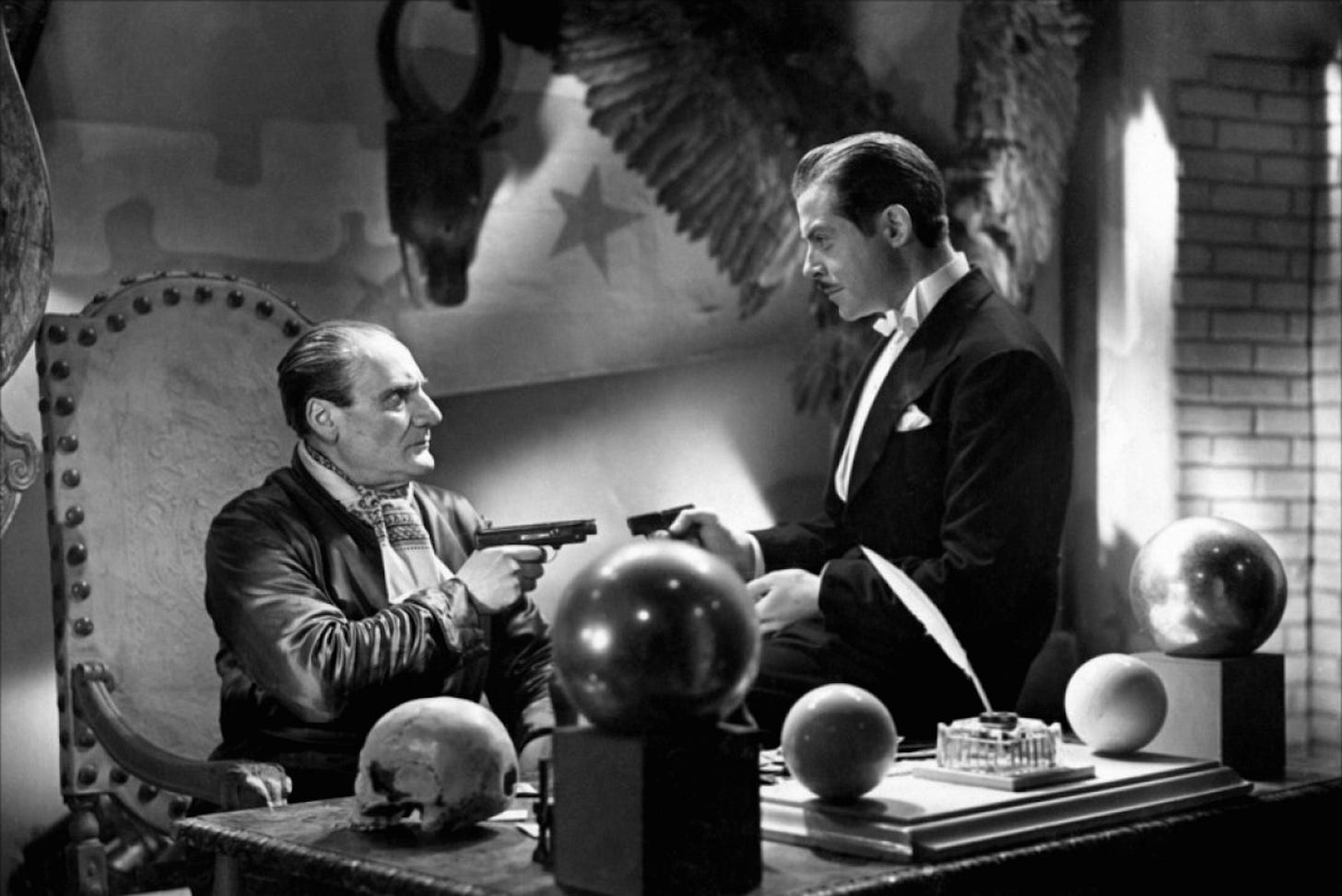
The Fantastic Night/La nuit fantastique
(1942, Marcel L’Herbier, 103 min) 4:45
Silent film giant Marcel L’Herbier struggled to regain his form in the sound era, but he hit his stride with La nuit fantastique, in which a harried laborer (Fernand Gravey) discovers an alluring world in his dreams with a dream-girl (Micheline Presle) beset by a sinister, magic-practicing uncle (a wonderfully diabolical Saturnin Fabre). L’Herbier pulls out all the stops in this superbly surreal fantasy that will make you wonder if you’re awake or dreaming what you’re seeing on screen!
The Chips Are Down/Les jeux sont faits
(1947, Jean Delannoy, 92 min) 6:45
The wonderful Micheline Presle is the last great star of the “cinema de papa” period to still be with us today (she turned 100 last August), and here, in MCP executive director Don Malcolm’s favorite of all the films he’s brought back to American screens, she is at her most brilliant as the martyred wife of a dictator’s lackey who poisons her in order to marry her more pliant sister.

In the afterlife, she meets and falls in love with a murdered resistance leader (Marcel Pagliero) and, in this noir fantasy, they are allowed to return to Earth to right the wrongs against them—so long as their love remains intact. Can they turn things back or will they be tripped up by fate? With a screenplay by the noted existentialist philosopher Jean-Paul Sartre, Les jeux sont faits is utterly, triumphantly unique.
SO there you have it—our very different pathway through the astonishingly vast “lost continent,” navigated in a full-bodied way that simply isn’t happening anywhere else (even in France!). I hope that the late, great Bertrand Tavernier is looking down on us with approval for taking yet another “road not taken.” As he knew better than anyone, the “cinema de papa” was really where it was at—and the “where” for you is at the Roxie starting on April 1.
Please consider joining us for the full adventure by purchasing an all-festival pass via this link ($99, or about $5.50 a film). Single tickets will go on sale in mid-March.
Join us!




